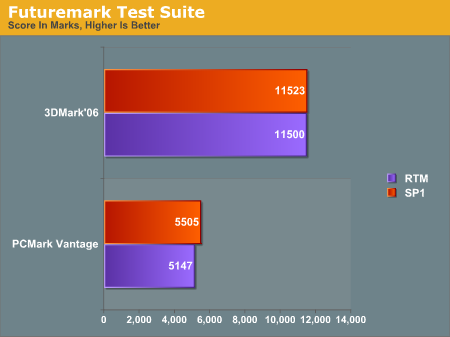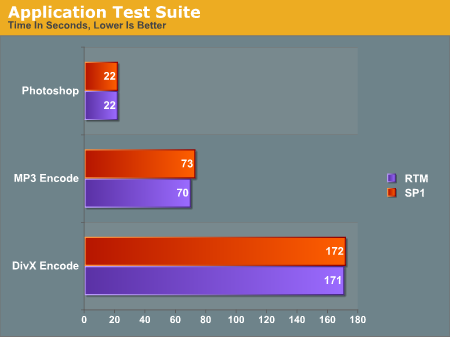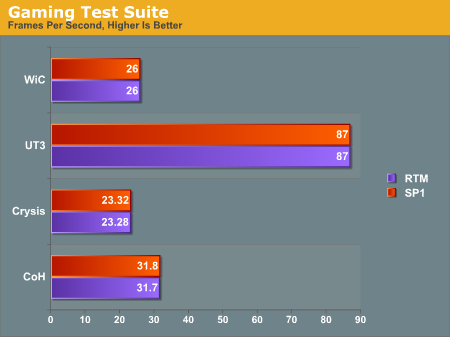Vista vs. Vista SP1
We’ll start with our Futuremark benchmark applications, 3DMark 2006 and PCMark Vantage. 3DMark in spite of being a graphics benchmark is sensitive enough to pick up on any changes in CPU or GPU performance (in this case any optimizations that reduce overhead), while PCMark Vantage is a full suite of benchmarks to measure overall system performance. It’s also one of the few benchmarks that we’re using that has a 64-bit mode.

Starting with 3DMark, the change in performance is effective imperceptible at 0.2%, well within experimental variance. This just goes to show there haven’t been any changes in overhead. PCMark however is far more interesting; here we get a full 7% score increase, indicating that SP1’s effects are felt outside of our earlier benchmarks. Drilling down ino PCMark’s subscores, we found that the higher score is a result of improvements in data compression scores, data encryption scores, and searching in Windows Mail, all of which can be attributed to improvements in file I/O performance. All other subscores are virtually unchanged.
Moving on to our application specific benchmarks, we have our DivX encoding test, our iTunes/LAME MP3 encoding test, and the Retouch Artists speed test for Photoshop. DivX stresses I/O somewhat, while the rest of the tests are largely memory and CPU-bound.

Here we see no notable changes in performance moving to SP1. All of the application tests come back with virtually identical scores.
Finally we have our gaming tests. Games tend to be good
a great way to stress all the components in a system, so this should give us a better idea
of how far improvements in Vista’s file I/O system stretch. For our games we have the RTSes World in Conflict and Company of Heroes, and the FPSes Crysis and Unreal Tournament 3.

In spite of the more rounded nature of gaming tests compared to our application tests, the results are the same with no perceivable improvement in performance. At this point it’s clear that what performance improvements Vista does offer are limited to a handful of situations where we are specifically file or network I/O bound. What this means for any given application is that it is unlikely to see a performance improvement due to SP1.
We also ran some quick testing with startup and shutdown times to see if Vista improved performance there at all; there were a couple of hotfixes in SP1 that dealt with these matters.
| Vista Startup/Shutdown Performance | ||
| |
Pre-SP1
|
Post-SP1
|
| Startup Time |
33 Seconds
|
28 Seconds
|
| Shtudown Time |
32 Seconds
|
31 Seconds
|
| . | ||
While shutdown time doesn’t see any real performance improvements, we are surprised to see an improvement in startup time by several seconds. Vista is not notably slow to start up in the first place, so we weren’t expecting much improvement if there was to be any at all. Shaving off 5 seconds for a 14% improvement in startup time (getting startup below 30 seconds altogether) is a pleasant surprise.










62 Comments
View All Comments
siniranji - Saturday, April 26, 2008 - link
when i apply service pack 1 to my licensed Vista, it turns toevoluation version and due date is june 2008
siniranji - Saturday, April 26, 2008 - link
when i apply service pack 1 to my licensed Vista, it turns toevoluation version and due date is june 2008
shinomen - Saturday, March 8, 2008 - link
When Vista was first about to hit shelves I was all for upgrading to the new OS. But once I started using it in real world environments, I found that my productivity started to suffer due to the revamped interface, lack of support for some older hardware and software, and added security.I understand anything new is going to be a learning experience, but it doesn't help when every move I make is preceeded with an extra step or message of confirmation (are you sure you want to continue, how about now, do you want to continue).
For example, I'm trying to troublshoot networking issues with a client of mine. I'm use to window key + R , type cmd, press enter, ipconfig /release and the computer does what I want. But with Vista, I have to take the extra step of right clicking the cmd program and running with elevated privilages (I have now found a keyboard shortcut to do the same)
Or for the same scenario, I need to telnet into the dsl modem. So again, I hit Window Key + R, cmd, telnet. But with windows vista, this is not installed. Ok, now I have to go to add remove programs, windows components, and install the telnet. (I hope I remembered to bring my DVD!)
I understand that hardware support is largely due to manufacturers writing new drivers to be compatible with the new OS, but there were so many times I would install a peice of hardware (or printer specifically) and there would be no driver support. But because the manufacturer is making no real money off updating the driver and would in fact lose money by going back and writing the driver, they take their time realeasing it in hopes that the consumer will purcahse a newer model that already is supported in Vista. Again, not specifically Windows fault, but windows did change the way drivers are installed or supported (I don't know the techical details why it doesn't work, but I know it doesn't work).
Software support, you're lucky if you can get the older software to work, (i.e. quickbooks 2006) otherwise just go out and purchase new software. No one likes to have to drop money to upgrade their line of business software just to get back to a functioning state that they were in with Windows XP. (Might not be a big deal with one computer, but when you're talking 5 to 10 computers, the money adds up)
Performance. If your going to buy a new machine that has higher end hardware, then vista most likely will perform well (not as well as the same machine running xp, but well). But if you're going to take a machine running xp and upgrade it to vista just to take a performance hit, then it is not wise to upgrade. (Also, don't forget that now that you upgraded the old machine to vista, you may need to purchase more ram, and also update any software that is not compatible with vista)
So, those are my gripes for the people that say Vista is a better operating system, or for the people that say they have had no problems with their vista computers.
(side note: many times when I ask my pro vista customers what they think about vista, their response is "Oh, I love it, I don't know why people say they have problems, I haven't had any trouble with it". So my response is "Yeah, alot of people with older hardware and software were have compatibility issues", and my customer says, "Oh yeah, I couldn't get my printer to install, so I just bought a new one" ----great if you have the money to "just buy a new one")
ufoall - Monday, March 3, 2008 - link
I was running vista on my E4400 with 2g memory and PCi e .. vista runs very slow after install couples of software.. if i install same software on my xp it runs much faster than vista... vista is a crap compare to oldies windows os...Beartwo - Monday, March 3, 2008 - link
Since buying a new pc just before christmas I have been plagued with Messenger, Windows mail, Explorer and other internal applications crashing.The system is based on an Asus P5K-E mb with Core 2 Quad cpu, 3 Gb of RAM, Nvidia GeForce 8800GT gfx.
From the first moment I turned the pc on I kept getting these errors. I flashed the bios and installed all the latest drivers (certified ones), but the problems persisted.
It got to the point where Vista was simply not usable, the error reports I got from Vista were about as useful as a bicycle would be to a fish...
I am back to Windows XP, with a few less dollars in my pocket and a useless OS sitting in a drawer.
As far as I am concerned Vista has been a waste of time and money... kinda reminds me of a friend who bought a pc with Millenium preinstalled... sheesh.
just4U - Sunday, March 2, 2008 - link
I've been using Vista64 for 2 weeks now and I must say .. I am very happy with it. I was so leary about moving to a 64bit os and then adding Vista on top of it .. but it worked out fine. It accually seems to be more responsive in windows aplications and load times. Not sure if that's just because it's a fresh install or not yet. Anyway...That's without SP1 installed by the way. I've been waiting for the official launch of it instead of beta versions and release candidates.
jkantor - Sunday, March 2, 2008 - link
I don't know what's worse: settling for a world in which software "development" means shipping it before it works - or excusing a monopoly for forcing us to purchase an overpriced upgrade that offers no real improvements over the previous version.Mark Huson - Sunday, March 2, 2008 - link
I have read somewhere that with SP1, Vista allows the user to install Windows XP from within Vista, and automatically adding the Windows XP install to the bootloader. Is this true?hoelder - Friday, February 29, 2008 - link
I beta tested Vista and was very dismayed about it's resource hungry attitude and the money I would have to fork over to upgrade hardware so I would not lose any performance. It was not worth it with the enormous sticker price of Vista Ultimate. I still insist that Vista needs 4 GB of RAM (people were laughing at me then) and a SCSI RAID controller with 4 74GB drives RAID 5. And then something amazing happened. I was contracted by a company that used Linux. First, Linux is for geeks, second I get everything I need to do everyday business work. I discovered that for a business solution Linux was a more reliable solution if you looked at Enterprise Linux Desktop by SUSE or Red Hat and has a lot to offer to developers or administrators. So forget Vista, get Linux.mczak - Thursday, February 28, 2008 - link
This is really lame to just show 4GB even if only 3GB or so are usable. Ok maybe some users got confused if it didn't show all ram installed, but now make them believe all ram is available is better? Now it will be even harder to convince people that 32bit windows CAN'T use 4GB ram... Come on it can't be that difficult to show something like "4GB ram installed, 3GB addressable" instead.And the multimedia scheduler is still pathetic. Almost looks like MS didn't want to admit the concept is fundamentally broken, instead they offer some way for powerusers to make its behaviour acceptable...